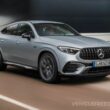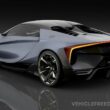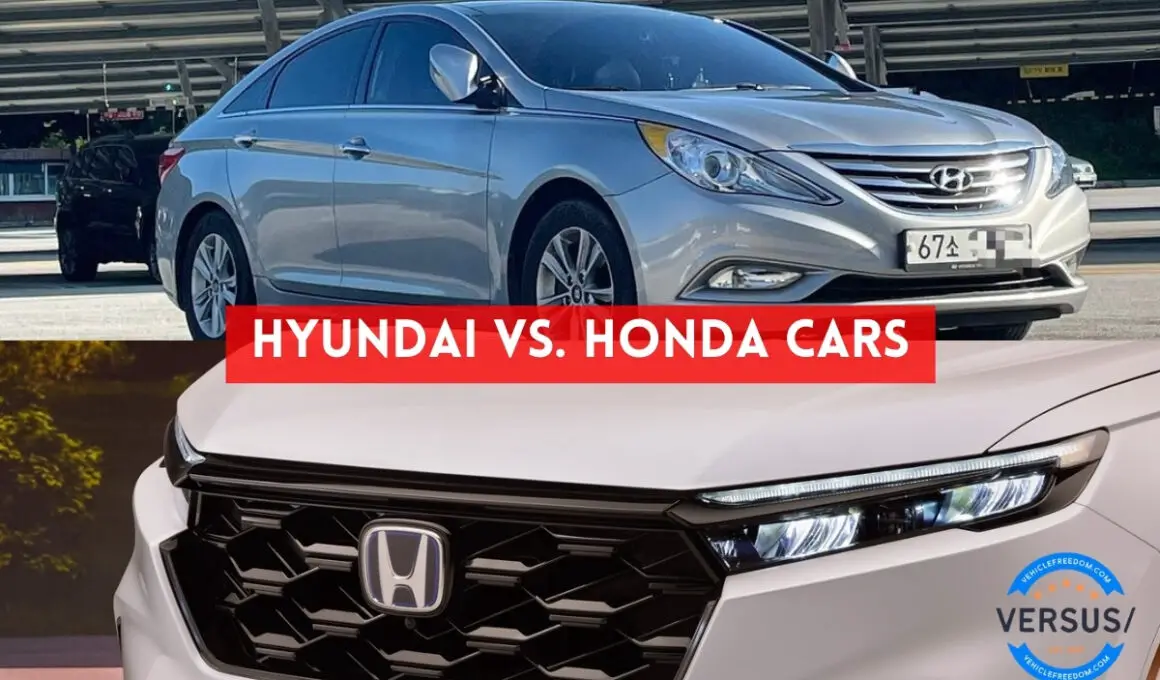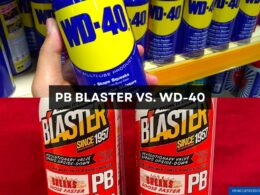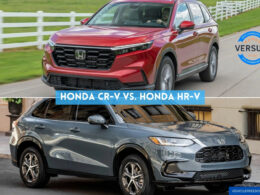In This Article Show
I’m sure many of you have found yourselves in the age-old debate: Hyundai or Honda? As an experienced mechanic with over 13 years in the field, I’ve had the privilege to work closely with both brands.
Over the years, I have tinkered under their hoods and test-driven them, listened to feedback from countless customers, and observed the longevity and reliability of these vehicles up close.
My dual-role as a mechanic and a blogger has given me a unique perspective on this matter.
I’ve distilled these years of hands-on experience to bring you an insightful comparison of these automotive giants. So, without further ado, let’s dive deep into the world of Hyundai and Honda!
Hyundai vs Honda: Historical Background
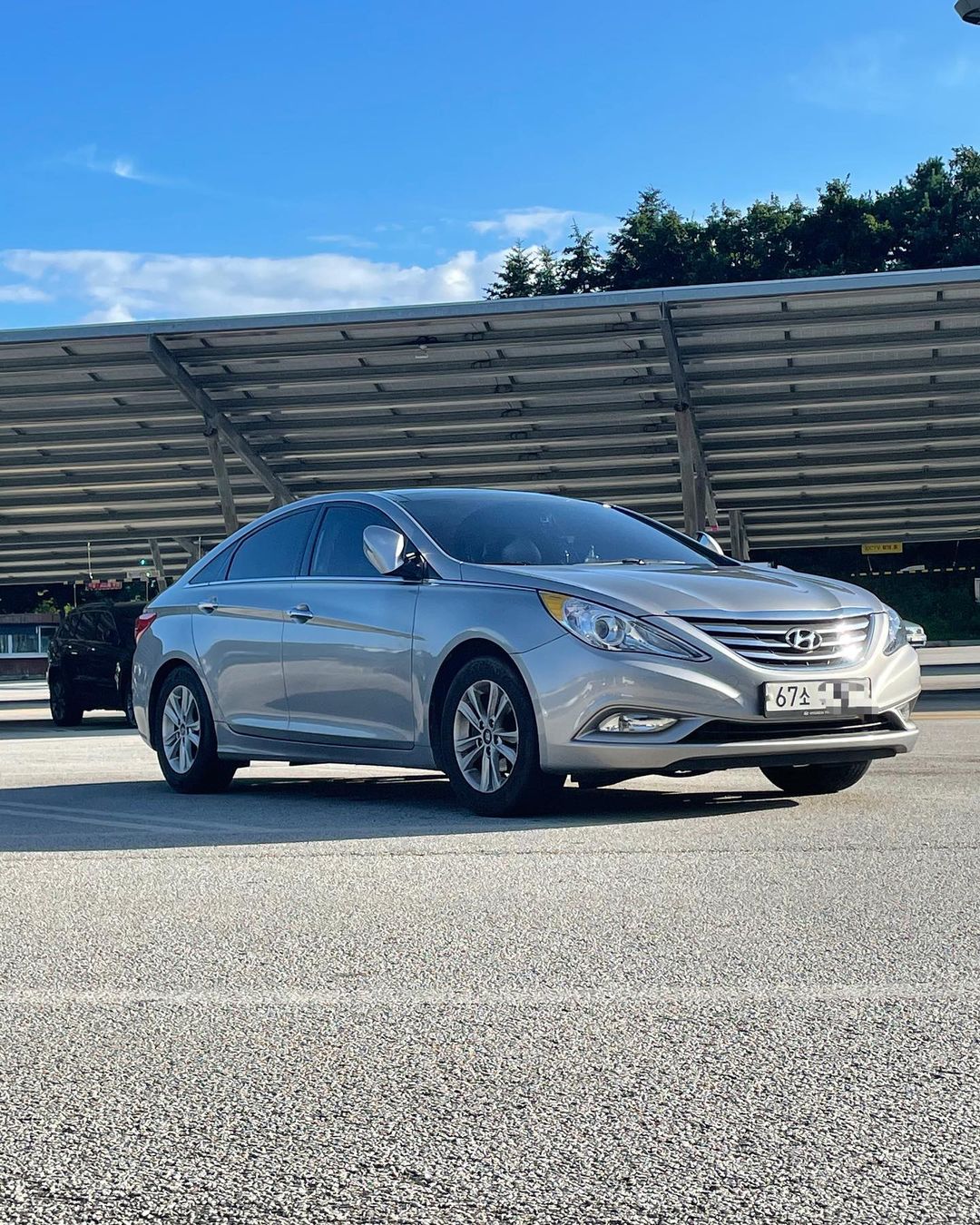
Hyundai
Tracing back to its roots, Hyundai Motor Company, hailing from South Korea, began its journey in 1967. Contrary to popular belief, Hyundai’s first car wasn’t an original design but was assembled in partnership with Ford.
Over the years, the company has come a long way from its modest beginnings. Fueled by ambition and a vision for innovation, Hyundai, within a short span, established itself as a force to be reckoned with in the automotive world.
Their dedication to crafting cars that combined efficiency with affordability quickly caught the global market’s attention. I’ve seen first-hand the leaps and bounds in Hyundai’s design, technology, and overall brand evolution.
Honda
Honda’s story unfolds in a different part of Asia: Japan. Founded in 1948 by Soichiro Honda and Takeo Fujisawa, it began as a motorized bicycle manufacturer. The journey from two-wheelers to four-wheelers was a transformative one.
By the 1970s, Honda had already made an indelible mark in the American market by introducing models like the Civic and Accord, celebrated for their reliability and fuel efficiency.
Over the years, they’ve cultivated a reputation for pushing boundaries, especially in engineering and performance. In my professional journey, Honda cars have been a constant presence, constantly impressing me with their innovation and reliability.
Both brands, originating from different cultures and histories, embarked on distinct paths but with a shared goal: to redefine the automotive industry. Their legacy is not just in the cars they’ve produced, but in the benchmarks they’ve set for quality and innovation.
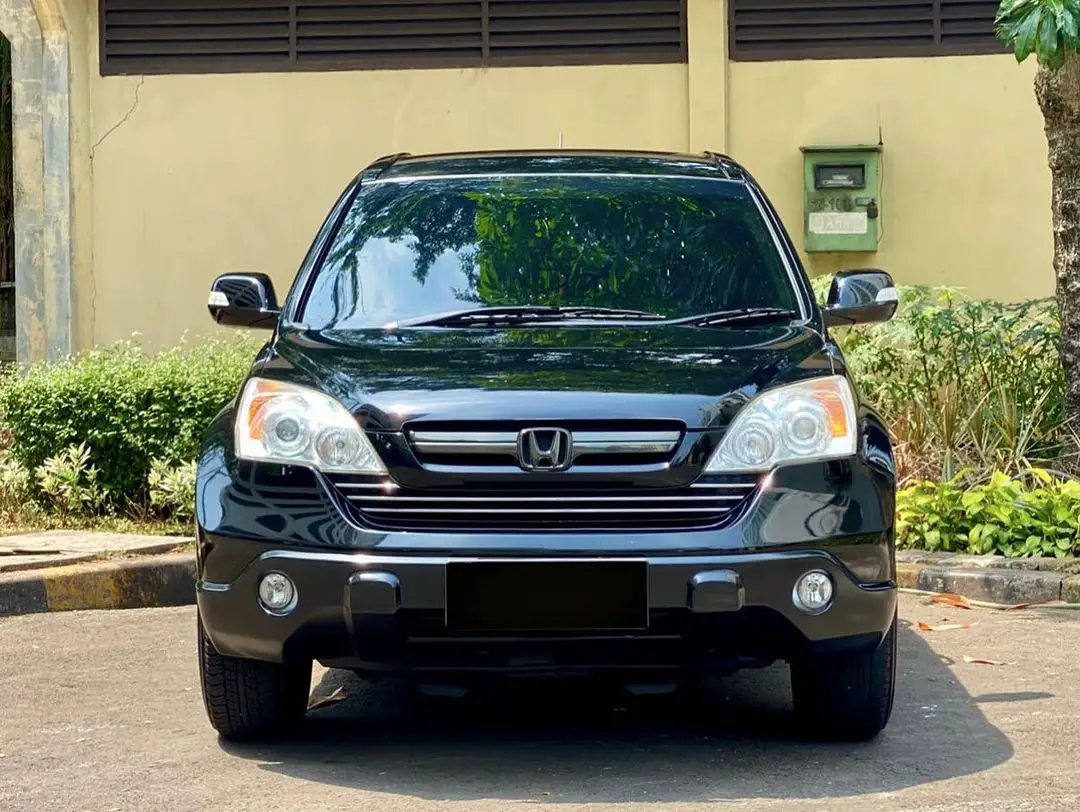
Performance Comparison
Engine and Power
Hyundai
Over the years, Hyundai has consistently upped its game in terms of engine technology.
Modern Hyundai vehicles are equipped with their efficient GDI (Gasoline Direct Injection) engines, and some models even boast turbocharged variants, adding a zesty punch to their performance.
Hyundai’s meticulous attention to balance – ensuring power without compromising on efficiency.
Honda
Honda has always been at the forefront of engineering prowess. Their acclaimed VTEC (Variable Timing and Lift Electronic Control) system is a testament to this.
This technology, introduced in the late 80s allowed Honda engines to achieve high performance and fuel efficiency. As a mechanic, I’ve always admired the smoothness and responsiveness of Honda engines, a sentiment many of my peers echoed.
Handling and Drive
Hyundai
Hyundai’s recent models, especially those under the ‘N’ performance line, are a treat to drive. Their focus on achieving a comfortable yet dynamic driving experience has garnered praise.
Precise steering coupled with a well-tuned suspension ensures that the car remains grounded even at higher speeds.
Honda
Handling has been one of Honda’s strong suits. Whether it’s a compact sedan like the Civic or a more sporty model like the Civic Type-R, the driving experience is agile and tight.
In my professional experience, Honda cars consistently offer a feeling of connectivity to the road, giving drivers enhanced control.
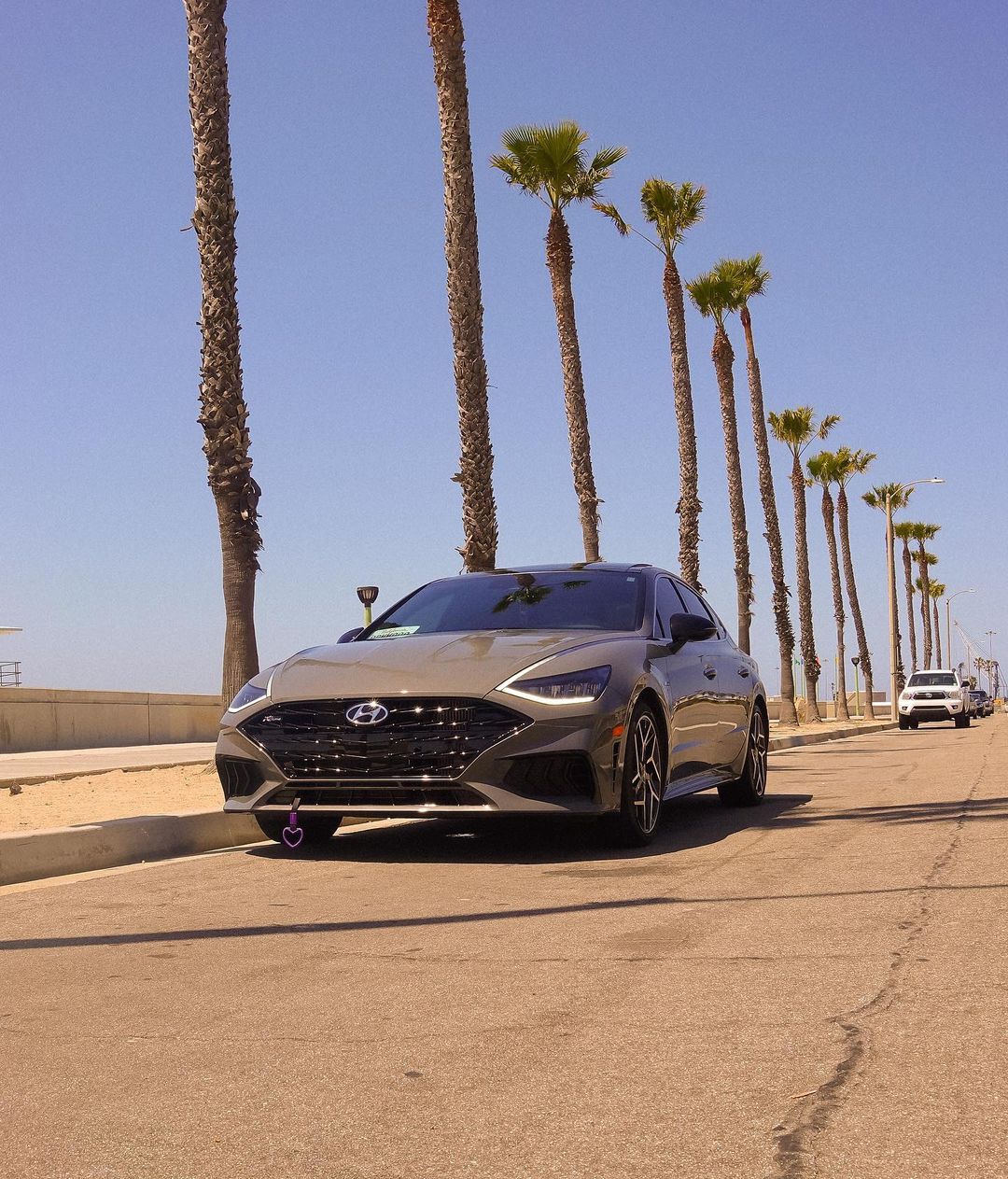
Fuel Efficiency
Hyundai
In today’s world, fuel efficiency is not just about saving money—it’s about environmental responsibility. Hyundai recognizes this. With their EcoShift Dual Clutch Transmission and Hybrid models, Hyundai aims to optimally balance power and fuel economy.
Honda
Honda’s commitment to fuel efficiency is legendary. Their Earth Dreams technology series, which encompasses a range of innovations from engines to transmissions, is designed with fuel efficiency in mind.
Over the years, working on various Honda models, I’ve seen the tangible results of this commitment: consistent high MPG numbers and satisfied customers.
Key Takeaway 📝
Hyundai and Honda offer a rich blend of performance and efficiency, each with unique strengths. As someone deeply entrenched in automobiles for over a decade, I can vouch for both brands’ dedication in their pursuit of automotive excellence.
Reliability and Safety
Track Record
Hyundai
Hyundai’s transformation over the decades is noteworthy. Earlier models, while budget-friendly, sometimes faced reliability concerns. However, the Hyundai of today is a testament to the brand’s dedication to improvement.
Their efforts were rewarded when they ranked high in various global reliability studies in recent years. My experience as a mechanic has shown a significant drop in major Hyundai-related issues, a testament to their commitment to quality.
Honda
Honda’s reputation for reliability is almost legendary in the automotive world. Many families swear by their Hondas, often passing them down from generation to generation.
Their engines are particularly known for their longevity. It’s a frequent occurrence in my workshop to see older Honda models still running smoothly, echoing their commitment to enduring quality.

Safety Features
Hyundai
Safety is a priority for Hyundai. Their SmartSense suite, present in many modern models, offers a range of advanced safety features. These include Forward Collision-Avoidance Assist, Lane Keeping Assist, and Blind-Spot Collision Warning.
Hyundai’s dedication to safety doesn’t just stop at technology; they’ve also emphasized structural safety, ensuring their cars offer optimal protection during collisions.
Honda
Honda’s approach to safety is holistic, captured in their Honda Sensing suite of safety features. This includes the Collision Mitigation Braking System, Road Departure Mitigation System, and Adaptive Cruise Control.
Additionally, Honda’s ACE (Advanced Compatibility Engineering) body structure is designed to distribute crash energy more evenly, reducing the impact on occupants. In my years working on Honda cars, I’ve been consistently impressed by the brand’s forward-thinking approach to safety.
Warranty & Maintenance
Hyundai
Hyundai offers one of the most competitive warranties in the market, which clearly reflects their confidence in the reliability of their vehicles.
Their standard warranty, often termed “America’s Best Warranty,” is a testament to their commitment to their customers. From a mechanic’s viewpoint, this ensures peace of mind for the car owner and indicates the brand’s trust in its product.
Honda
While Honda’s standard warranty is in line with industry norms, the brand’s reliability often means fewer trips to the workshop. Maintenance costs for Honda vehicles, based on my experience, tend to be on the lower side, given the car’s inherent durability and the brand’s efficient design principles.
Design and Aesthetics

Exterior Design
Hyundai
Hyundai’s evolution in design over the years has been nothing short of transformative. The brand has gravitated towards a more futuristic and sleek look, evident in their ‘Fluidic Sculpture’ design philosophy.
This is embodied in the cascading grille, dynamic lines, and sharp edges that many of their current models showcase.Hyundai’s design progression stands out, marrying elegance with a modern flair.
Honda
Honda’s design language has always resonated with a sense of timeless appeal. Their vehicles, characterized by clean lines and a sporty stance, possess a certain universal charm.
Models like the Civic and Accord have evolved but maintained a consistent identity, a balance of sophistication and dynamism. In my workshop, it’s common to observe the continuity in Honda’s design ethos, from older models to the latest ones.
Interior Comfort and Tech
Hyundai
Stepping inside a Hyundai feels like entering a well-thought-out space. Their focus on ergonomic design ensures driver comfort, while the use of premium materials in recent models elevates the overall experience.
Hyundai’s infotainment systems are intuitive and packed with features, making them a favorite among tech-savvy users. Over the years, I’ve noticed that Hyundai owners often commend the brand’s interior innovations and user-friendly tech interfaces.
Honda
Honda interiors have often been praised for their simplicity and functionality. Every knob, button, and feature feels purposeful, reducing clutter and enhancing usability. Their commitment to spaciousness, irrespective of the vehicle’s size, offers both drivers and passengers a comfortable ride.
And from a mechanic’s perspective, the durability of Honda’s interior components is commendable. They’ve also kept pace with technological advancements, ensuring drivers have access to the latest infotainment and connectivity features.
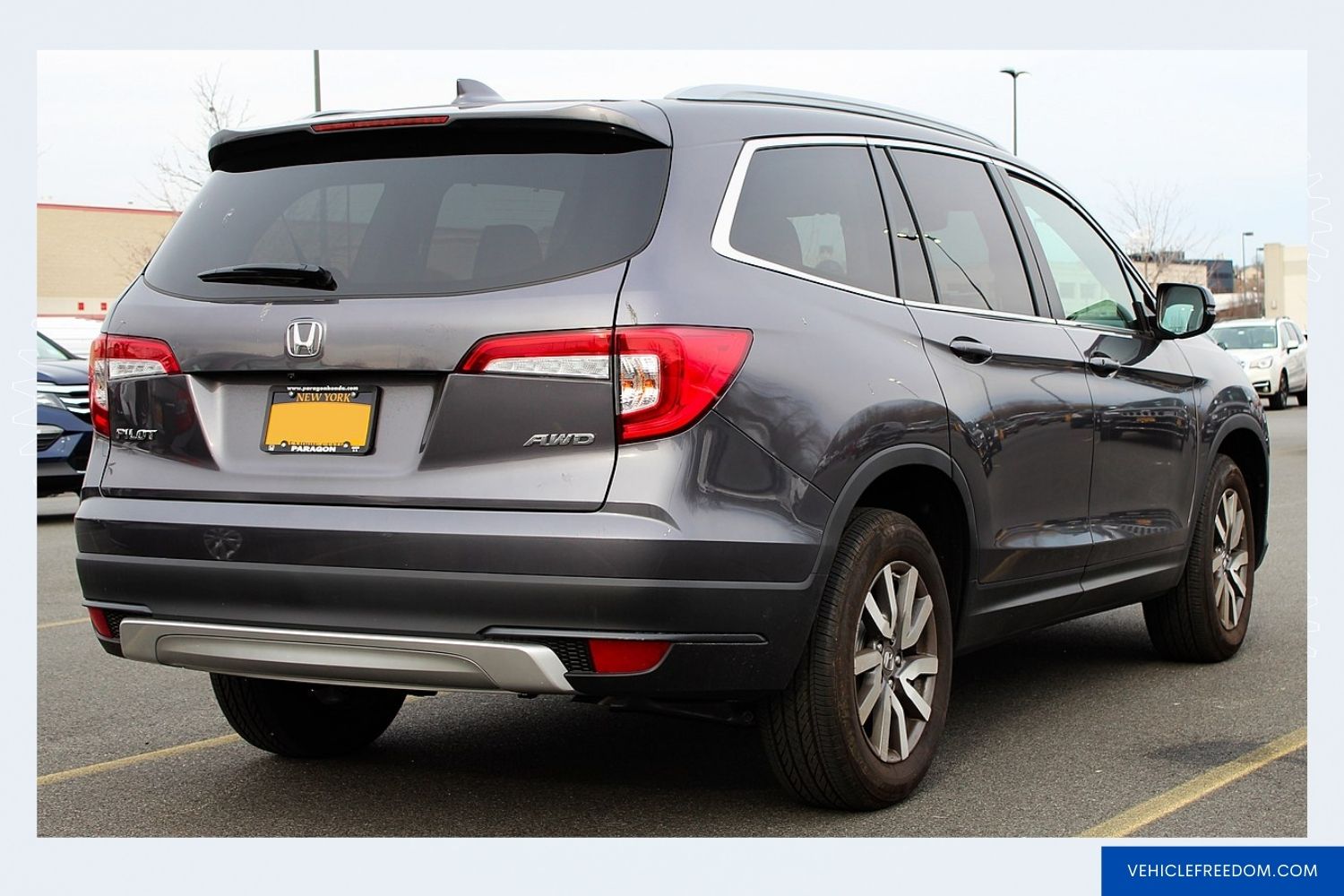
Value for Money
Price Point and Features
Hyundai
One of Hyundai’s most commendable strategies has been its ability to offer feature-packed vehicles at competitive price points. The brand often includes amenities in their base models that other competitors reserve for higher trims.
This approach has consistently offered Hyundai owners a sense of getting more for their money, allowing the brand to carve out a niche among value-conscious buyers.
Honda
Honda’s pricing structure aligns with its brand philosophy of reliability and lasting value. While some of their models might come with a slightly higher initial price point than competitors, the investment often pays off in the long run.
The brand’s focus on durability, resale value, and consistent performance means Honda owners often enjoy reduced overall ownership costs, making it a smart financial decision in the bigger picture.
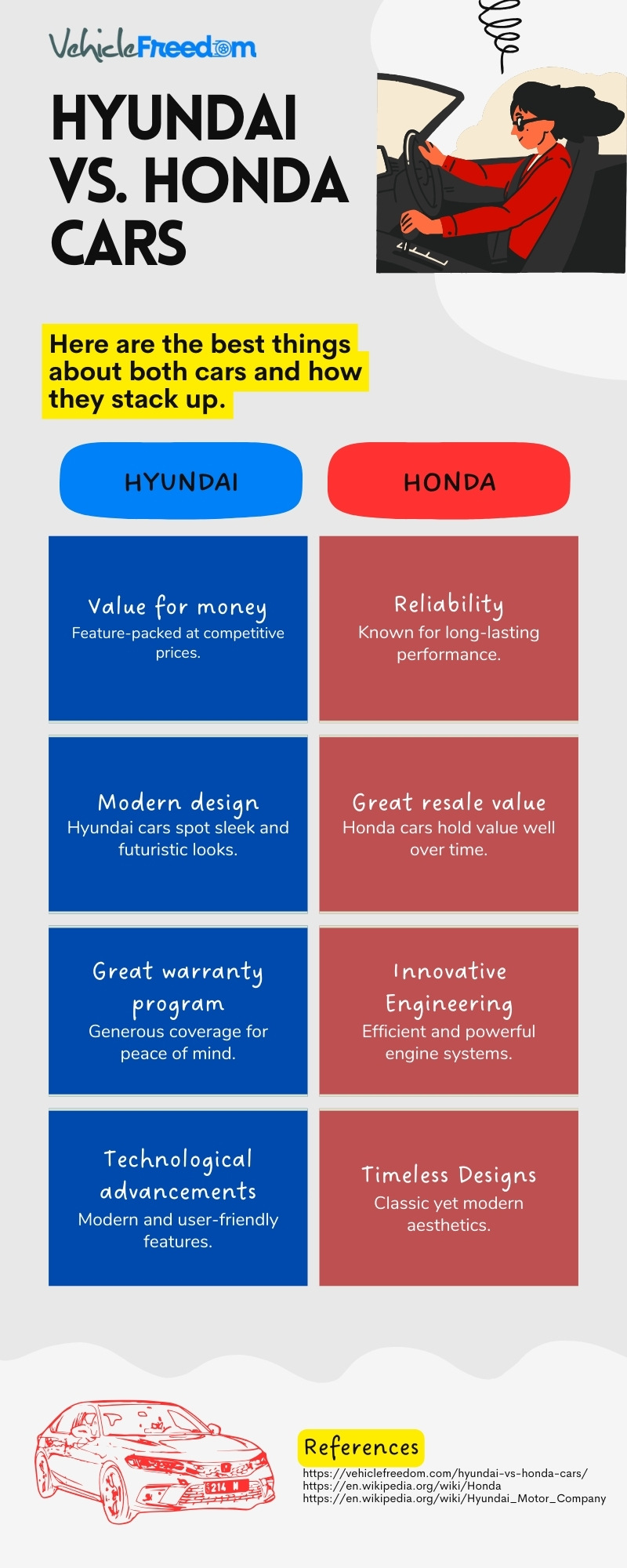
Resale Value
Hyundai
Historically, Hyundai vehicles faced challenges in retaining high resale values, mainly due to earlier perceptions of the brand. However, with the brand’s significant strides in quality, performance, and safety in recent years, this trend has started to shift.
Modern Hyundai cars are seeing much better resale values, reflecting the brand’s improved standing in the market.
Honda
With its longstanding reputation for reliability, Honda often boasts impressive resale values. Models like the Civic, Accord, and CR-V regularly feature on ‘Best Resale Value’ lists.
It’s a sentiment I’ve noted among customers time and again—owning a Honda ensures a dependable ride and a favorable return on investment when it’s time to sell.
Maintenance and Upkeep
Hyundai
Hyundai’s aforementioned extended warranty is not just a mark of their confidence in the product but also translates to savings for the owner.
Maintenance costs are generally reasonable, and with the brand’s focus on durability in recent years, many owners find themselves visiting workshops primarily for routine check-ups and not major repairs.
Honda
Honda’s design ethos revolves around longevity, which inherently means fewer maintenance woes for the owner.
Parts are robust and long-lasting; they’re generally affordable and readily available even if replacements are needed. My experience as a mechanic affirms this—when treated right, Honda cars demand minimal unexpected visits to the garage.
Personally
Both Hyundai and Honda present compelling arguments in the contest of value for money. Hyundai shines with its feature-rich offerings at attractive prices, while Honda emphasizes long-term value through reliability and resale potential. As someone who’s had a close watch on the industry, it’s evident that both brands have their unique strengths in delivering value to their customers.
Key Takeaways
Historical Background
- Hyundai emerged from South Korea, initially collaborating with Ford, and has since evolved into a global automotive powerhouse with its innovative designs and technologies.
- Honda, originating from Japan, transitioned from motorized bicycles to cars, consistently delivering vehicles known for their reliability and engineering prowess.
Performance
- Hyundai impresses with its GDI engines and a commendable balance between power and efficiency.
- Honda stands out with its VTEC system, ensuring both high performance and notable fuel efficiency, underlined by my consistent experiences with their engines over the years.
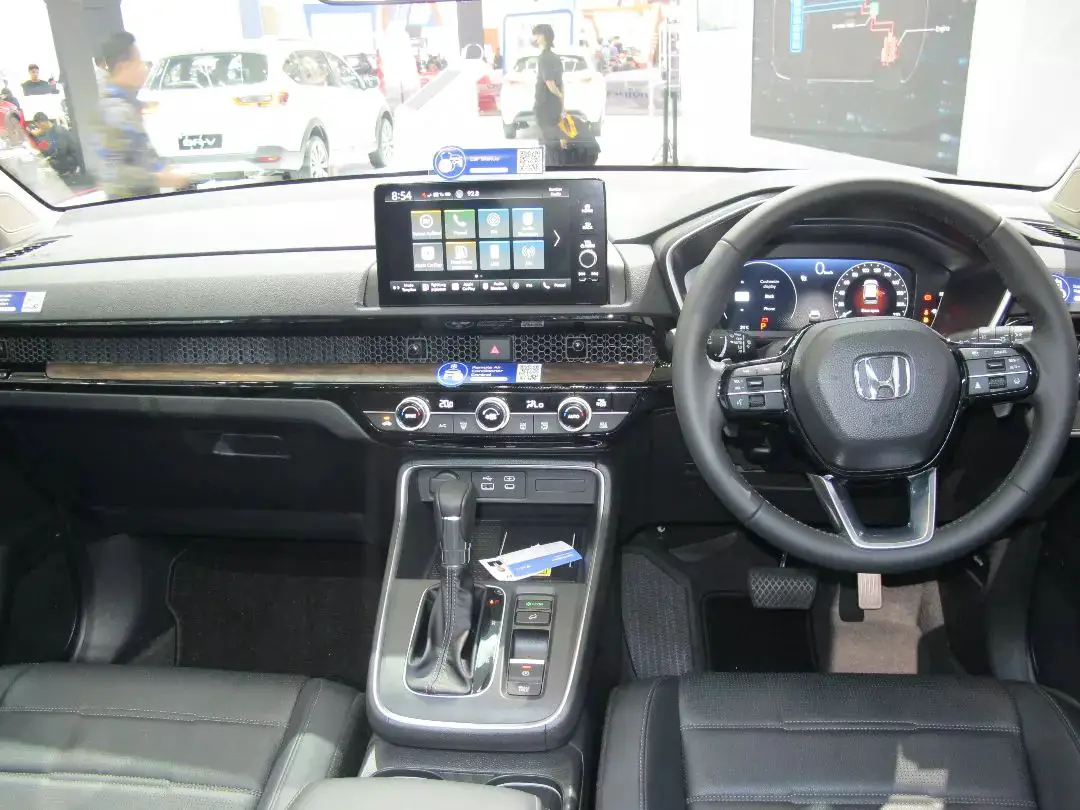
Reliability and Safety
- Hyundai has significantly improved its reliability, evident in global rankings and reduced major issues I’ve observed. Their SmartSense suite further underscores their commitment to safety.
- Honda has a longstanding reputation for reliability and safety. Their Honda Sensing suite and ACE body structure are indicative of their forward-thinking approach to passenger safety.
Design and Aesthetics
- Hyundai showcases a modern and sleek exterior design philosophy and offers both comfortable and technologically advanced interiors.
- Honda maintains a timeless design appeal, with interiors known for their simplicity, functionality, and durability.
Value for Money
- Hyundai offers feature-rich cars at competitive prices, providing great value. Their increasing resale values and reasonable maintenance costs add to this proposition.
- While sometimes priced slightly higher initially, Honda offers a comprehensive package of durability, impressive resale values, and lower overall ownership costs.
In essence 🌟
Both Hyundai and Honda have their unique strengths and offerings. My years in the automotive industry have allowed me to witness both brands’ consistent evolution and dedication.
Choosing between them often boils down to personal preferences and priorities. Whether you value immediate feature-rich offerings or long-term reliability and value retention, both brands have proven their mettle in the automotive world.
Which Is Right For You?
Choosing between Hyundai and Honda can be a nuanced decision. The ideal choice often revolves around individual needs, preferences, and what one values most in a vehicle. Let’s break down some scenarios to help guide this decision:
Budget-Conscious Buyers
Hyundai often edges out with its competitive pricing for feature-rich models. If you’re looking for a vehicle that offers many of the latest features without breaking the bank, Hyundai might be the way to go.
Long-Term Investment Seekers
Honda is renowned for its durable vehicles that retain value over time. Honda is a strong contender if you’re looking at a car as a long-term investment and prioritize resale value.
Tech Enthusiasts
Hyundai has aggressively incorporated their cars’ latest tech features, even base models. If a tech-heavy interior is a priority, you might lean towards Hyundai.
Reliability Purists
Honda has built a formidable reputation for reliability over the decades. Those who want a car that’s dependable and has the potential to be a family heirloom might gravitate towards Honda.
Design Aficionados
If you’re looking for a modern, sleek, and futuristic design, Hyundai with its ‘Fluidic Sculpture’ philosophy might catch your eye.
Honda remains a favorite for those who appreciate a more timeless, clean, and universally appealing design.
Safety-First Individuals
Both brands have a strong focus on safety. Your choice might come down to specific features or technologies. It’s advisable to compare the safety features of specific models side by side.
Environmental Advocates
Both brands offer hybrid and eco-friendly models. If this is a priority, dive deeper into their respective eco ranges to find a match for your environmental commitment.
Both Hyundai and Honda have a lot to offer, and your choice will often come down to which aspects of a vehicle resonate most with you personally. Test drives can be invaluable – get a feel for each car, and see which aligns best with your lifestyle and preferences.
Wrapping it up
Navigating the landscape of the automotive world can be challenging, with each brand boasting its unique strengths and offerings. However, the comparison of Hyundai and Honda illuminates both brands’ dedication towards innovation, reliability, and customer satisfaction.
With its transformational journey from humble beginnings to a global powerhouse, Hyundai offers value-packed features and modern aesthetics. On the other hand, with its longstanding reputation, Honda underscores the importance of longevity, timeless design, and engineering prowess.
Both Hyundai and Honda have, time and again, showcased their commitment to not just meeting but often exceeding customer expectations.
At the end of the day, the choice between Hyundai and Honda hinges on personal preferences, priorities, and what one seeks in a vehicle. Both brands are commendable in their right, ensuring that whichever route you choose, you’re embarking on a journey of quality, innovation, and trust.



